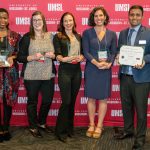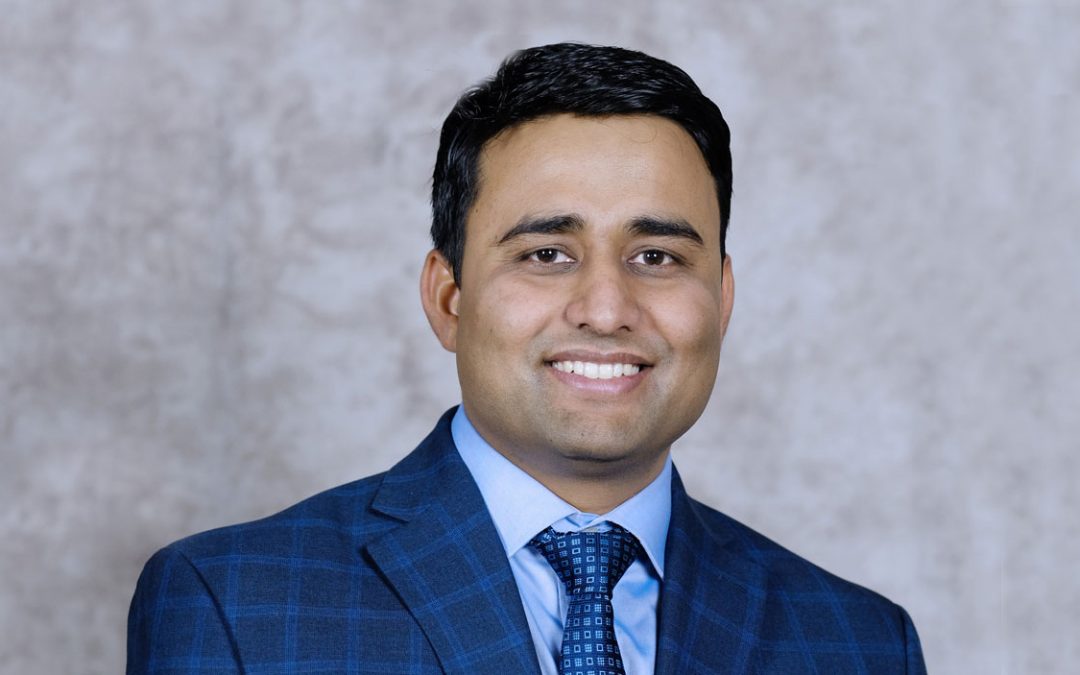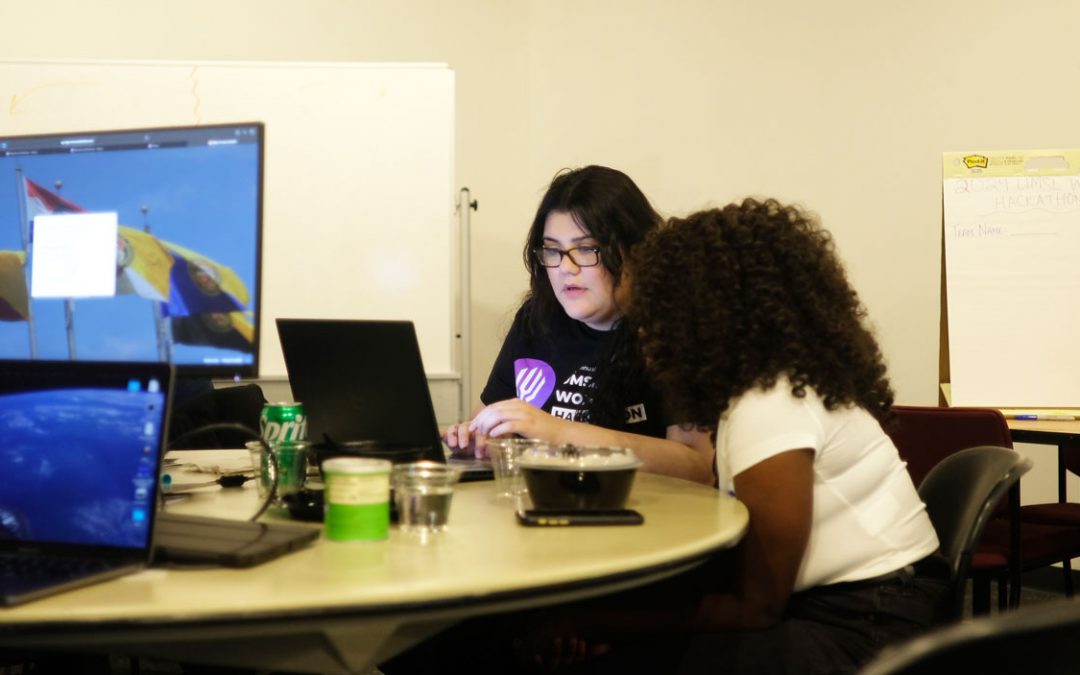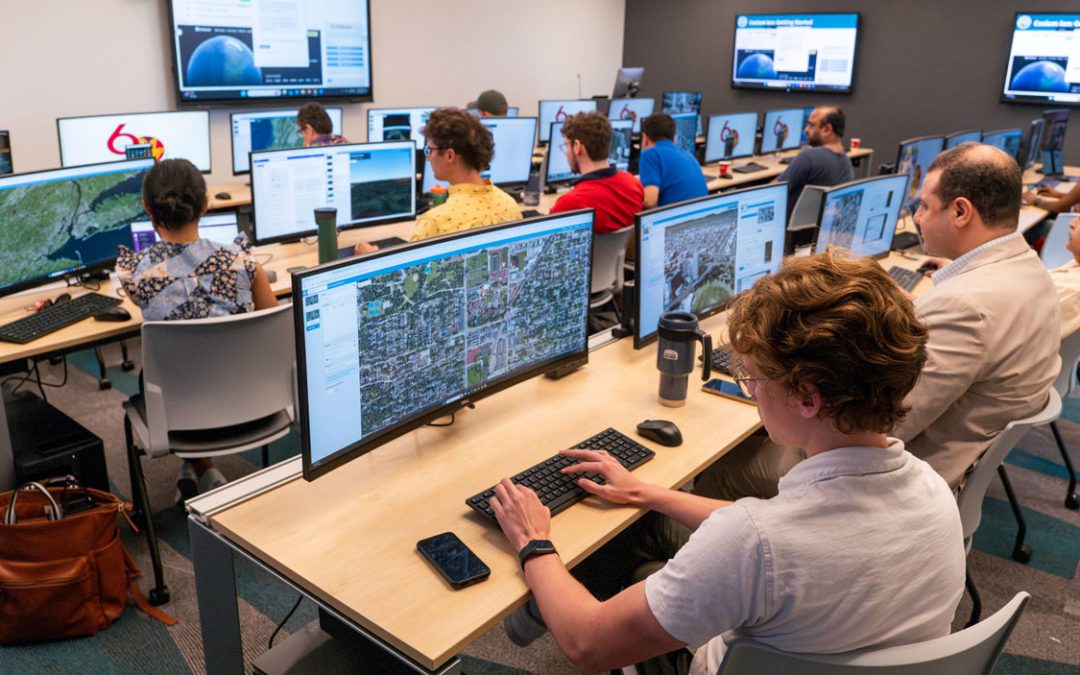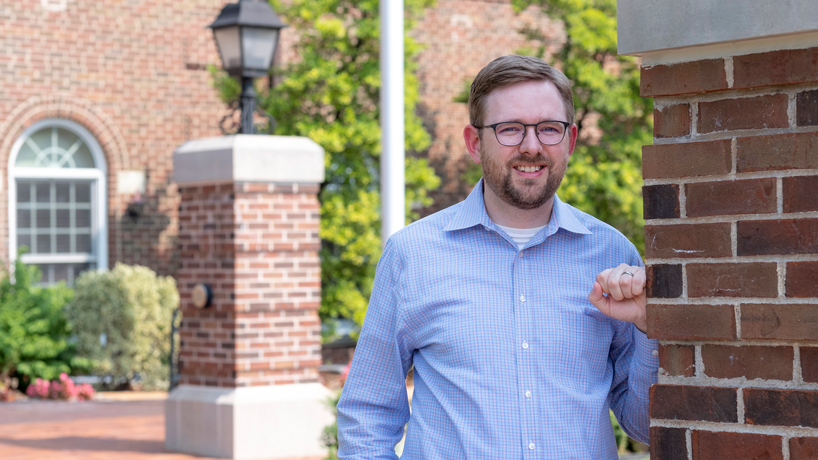
Clayton City Manager David Gipson, who earned an MPPA from UMSL in 2007, was named the 2021 recipient of the Jay T. Bell Professional Management Award from the Missouri City/County Management Association. (Photo by August Jennewein)
David Gipson has learned to adapt to uncertainty during his 18 months as the city manager of Clayton, Missouri.
He and his staff spent the early part of this summer working on a proposed budget for the 2022 fiscal year – a crucial exercise in preparing to deliver city services.
Gipson, who earned a Master of Public Policy Administration from the University of Missouri–St. Louis in 2007, had spreadsheet upon spreadsheet laid out for reference on tables in his corner office on the second floor of City Hall, a two-story colonial-style building hiding amid Clayton’s many office towers.
The problem was he and his team couldn’t be sure precisely how past numbers would compare to the reality they’ll see in the year ahead when, they hope, the city moves out of the COVID-19 pandemic.
“We’ve being extremely conservative with our revenue numbers because we don’t know where it’s going to come in,” he said. “We’re seeing encouraging signs. There’s more traffic on the streets. Commercial property owners are starting to feel better about tenants coming back, which is good. We’re starting to see more activity here. But it is a concern because these office buildings here are the engine – the economic engine – for this community.
“We need the office buildings to be full so that people come out and they park, they go to lunch, they have clients that fly in from all over the country and stay in our hotels and then they take their clients out to nice dinners. That’s really our big source of revenue.”
Gipson is prepared to deal with these kinds of challenges, and he’s confronted a lot of them since moving to Clayton in February 2020. Of course, it was only about a month later that that so much of everyday life shut down with coronavirus cases sweeping through the country.
He was still learning about Clayton’s operations when he suddenly found himself trying to figure out how to adapt them in a way that maximized safety while maintaining key services.
“In the end, I think it was a blessing because I was forced, in a very short period of time, to dive into everything that the city does and how it’s done and how it’s funded,” Gipson said. “Typically, if you move into a new role like this in a city, it takes you six months, at least, or maybe a year or a full budget cycle before you start to get a feel for how the city’s departments all operate, how they interact with one another and how you fund it. I didn’t have that luxury.”
With the help of his staff, Gipson found ways to trim about $2.5 million worth of expenditures from the budget to cope with the city’s sudden drop in revenue with so much office space shuttered and restaurants and hotels empty or closed.
He’s continued to work with the mayor and board of alderman to navigate the ups and downs of the past year and half.
Gipson traces his interest in the behind-the-scenes work it takes to keep cities running to his preteen years, when he discovered the game SimCity. He recalls spending hours laying out new urban environments, watching the “Sims” move in and interact with each, and reacting to problems – traffic jams, power outages, natural disasters – that arose along the way.
It wasn’t until Gipson got to college at what was then Southwest Missouri State University that he realized there were careers for people working through the same issues in real life.
“I took a course in GIS, which is geographic information systems,” he said. “I started to get into geospatial science and mapping. I loved it, but I wanted to apply it to something. I noticed a planning course, and I knew with that first planning course that I was hooked because you were basically playing that game almost for real. You were laying out cities, and you were creating the built environment that people actually live their lives in. I thought that was so cool.”
Gipson went on to major in community and regional planning, finishing his degree in 2004. He landed a job as a planner for the city of St. Charles, not far from where he grew up, but he pretty quickly realized he was going to need more schooling if he was going to be ready to grow beyond that role and take on a broader portfolio of problems.
He started looking into graduate programs in public administration and researching his options.
“I talked to some different people here within the region,” he said. “UMSL kept coming up.”
Gipson was newly married and would soon welcome the first of his three children when he enrolled in the MPPA program in 2005. He appreciated the ability to take courses at night, and by taking nine hours each semester and six hours in the summer, he was able to complete the program in two years.
The curriculum was filled with practical courses on subjects such as human resources, law, finance and budgeting, organizational structure and organizational theory, but he found value beyond the course material.
“A lot of the leaders within our region, within this profession, went through UMSL’s program,” Gipson said. “Because of the way the program is structured, I found that there was a lot of interaction with those individuals. So, when I graduated, not only did I have the skills and the knowledge – the things you expect to pick up through a graduate program – but also the professional network to go along with it. I think that’s incredibly important.”
Gipson’s held a variety of roles since finishing his master’s degree in 2007. He worked as a governmental relations specialist in the mayor’s office in St. Charles, took over management of that city’s planning department and moved to Richmond Heights where, as assistant city manager, he oversaw information technology, public relations and human resources. Each one allowed him to gain experience and expand his knowledge.
From March 2015 until February 2020, he worked in Wentzville, starting as the assistant city administrator and getting promoted to the top position after Robert Bartolotta’s retirement in 2016. With his background in planning, Gipson found it particularly exciting to help lead Missouri’s fastest growing city, helping facilitate the development of new neighborhoods and commercial centers.
But the chance to move to Clayton – the county seat of St. Louis County and one of its biggest economic centers – was too good to pass up.
“The reason Clayton has always stood out in my mind as a place I wanted to be is the fact that, within two and a half square miles, you’ve got all of these high-rise buildings, these big commercial projects that you really don’t get a chance to work on in the metro area, and you combine that with the types of historic neighborhoods we have and the institutional presence that you have here with Washington University and with Fontbonne and Concordia Seminary,” Gipson said. “To have all these different things packed into such a small area was a really cool opportunity.”
Earlier this year, at a May meeting of the St. Louis Area City Management Association, members of the Missouri City/County Management Association surprised Gipson with the Jay T. Bell Professional Management Award, considered the organization’s highest honor and one that recognizes public service that displays high standards of accomplishment, professionalism and ethical conduct. It was made more meaningful because he joined a list of recipients that includes many of the people he’s looked up to and learned from in the profession.
Gipson also has been working to mentor future city administrators. For the past four summers, he’s taught a seminar course in city administration at UMSL. He likes giving back and preparing a new generation of civic leaders, but he’s found it beneficial for his own work.
“We go visit sites that some people wouldn’t want to go to – a wastewater treatment plant, for instance – or when we do a tour of New Town in St. Charles or we go to a fire station or a police station, they’re excited, they’re enthusiastic, they’re all learning,” Gipson said. “I learn along with them. It’s always a refresher for all these things. I find that it gives me a lot of energy. I kind of recharge in the summer while I do this class and get excited about what I do all over again.”



